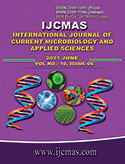


 National Academy of Agricultural Sciences (NAAS)
National Academy of Agricultural Sciences (NAAS)

|
PRINT ISSN : 2319-7692
Online ISSN : 2319-7706 Issues : 12 per year Publisher : Excellent Publishers Email : editorijcmas@gmail.com / submit@ijcmas.com Editor-in-chief: Dr.M.Prakash Index Copernicus ICV 2018: 95.39 NAAS RATING 2020: 5.38 |
Application of diverse conventional and non-conventional approaches/ technologies for sugarcane improvement meet problems of complex genome, narrow genetic base of crop, genetic recombination, and poor fertility coupled with long breeding cycle. To sustain the production, productivity of sugar industry in rational manner, it is imperative to counsel sugarcane farmers for the selection of ideal varieties based on growth duration and maturity groups, planting crop season and kind of crop (plant/ratoon) to be taken. Recently, precise technological interventions viz. sub-soiling, mechanical weeding and wider row spacing (4m paired row trench planting), intercrop cultivation (wheat, cabbage, garlic, sarson, onion etc.), quality seed production through tissue culture and single bud chip nursery raising have augmented per unit area productivity of sugarcane crop. Besides, to enhance input use efficiency in sugarcane cultivation especially judicious use of water through micro irrigation techniques (subsurface drip and fertigation), site specific nutrient management etc., and integrated management pest and diseases have rewarded the growers and industry in terms of higher cane production and sugar yield. Therefore, in order to sustain cane crushing in sugar mills and its sustenance towards national food security, the development of new varieties capable of giving higher cane yield and sugar recovery along with field stability and good ratoon ability, adoption of suitable time and method of planting, promotion of intercropping, mechanization for planting, strengthening of seed production programme, water management, integrated nutrient management approach, integrated pest management and refinement of agro-techniques for sustainable sugarcane farming system are presented in this chapter. Therefore, for making sugarcane farming a sustainable and profitable enterprise towards national food security, the credit flow and its proper utilization have to be ensured through regulatory framework.
 |
 |
 |
 |
 |